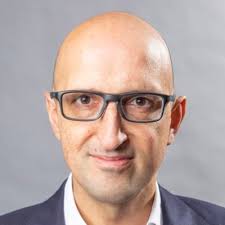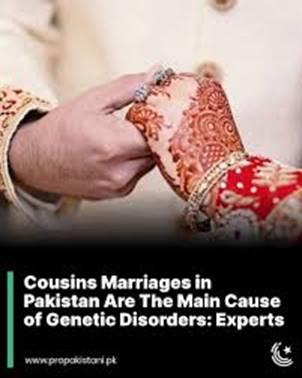
Much of the “extremism” emanating from Pakistani communities seemed to have a “clan” component. The perpetrators were linked not just through ideology or religion but by family ties stretching through generations – Photo The News International
Silence on Cousin Marriage Is the Unspeakable Face of Liberalism

By Matthew Syed
Let me start by telling you about Dr Patrick Nash, a somewhat shy legal academic who in 2017 came across an intriguing finding. He noticed that much of the “extremism” emanating from Pakistani communities seemed to have a “clan” component. The perpetrators were linked not just through ideology or religion but by family ties stretching through generations. He noticed something else too: these communities were cemented together by cousin marriage, a common practice in Pakistani culture. By marrying within small, tight-knit groups, they ensure everything is kept within the baradari, or brotherhood — property, secrets, loyalty — binding them closer together while sequestering them from wider society.
At this point, Dr Nash hadn’t come to understand the genetic risks, the patriarchal oppression, and the bloc voting, nor the growing evidence that rates of cousin marriage strongly correlate with corruption and poverty, but — like any good scholar — he thought he’d do a bit more digging.
But then something odd happened: several academics invited him to the pub for a “drink and chat”. He thought nothing of it, but it turned out to be an informal tribunal. “It was put to me that I might consider another line of inquiry that would be more ‘culturally sensitive’, less likely to provide ‘ammo for the right’ and less likely to ‘make life more difficult for myself’ as a junior, untenured academic,” he told me. “It was sinister.”
You might dismiss this as a one-off or perhaps the testimony of an overly sensitive scholar, but bear with me. You see, I sought to study this area during a sabbatical last year. It’s a subject close to home: when I went to Pakistan as a youngster to meet the extended family, my dad half-joked that he could arrange a marriage with a cousin. He said it lightheartedly but the conversation stuck with me. As I grew up, I kept noticing stories that revealed the genetic risks of cousin marriage and how it could lead to cultural separation. It seemed an area ripe for deeper research.
But I quickly discovered that researchers wouldn’t return emails or calls. When I got through to one geneticist, he said: “I can’t go there.” It was like hitting a succession of ever-higher brick walls. I then came across evidence that scientists examining the UK Biobank had found that levels of incest (father-daughter, siblings, etc.) were significantly higher in the British Pakistani community than in the wider population. This was a disturbing finding, possibly indicating abuse of a shocking kind. But the paper was never published, disappearing into what I

Instagram
can only describe as an Orwellian memory hole. When I approached the researchers, they were not prepared to talk on the record. One said that he feared he might not be able to bring up his children if he whispered the truth and lost his job as a result. It was like something out of Kafka.
What I hope you are gleaning from all this is how scientific inquiry is being distorted and suppressed out of an almost crippling fear of offending cultural sensitivities; how information vital to the public interest is being censored out of concern that it might be prejudicial to the “customs” of immigrant communities. It is a phenomenon that directly parallels the Rotherham scandal, in which young girls suffering horrific abuse at the hands of mainly Pakistani gangs were betrayed by the police and social services, which refused to investigate for fear of appearing racist.
Eventually, I wrote a column calling for a ban on cousin marriage in April last year. I was assisted by Nash, who had continued his research despite being warned off (his trump card was that his salary was paid not by his university but by the Woolf Institute, an independent body committed to free speech). To my surprise, the piece became one of the most-read stories of the year and was picked up in Scandinavia. Not long afterwards Norway, Denmark and Sweden announced plans to prohibit cousin marriage and Tennessee passed legislation.
Last week the movement picked up momentum when the Tory MP Richard Holden gave a brave speech in parliament calling for a ban. He was strongly opposed by Iqbal Mohamed, one of the independent “Gaza bloc” of MPs, who argued that cousin marriage is a good thing since it “strengthens family bonds”, perhaps the most stunning piece of (unintentional) satire in modern political history. Mohamed’s intervention, however, seemed to do the trick. After first implying that it had an open mind on a ban, the government changed its position to “no plans to legislate”, doubtless fearful of losing more seats to the Gaza bloc. I suspect it will come to regret this cowardly retreat.
But the other striking aspect of the debate was the sinister influence of scientific malpractice. MPs on all sides kept referring to the genetic risks of cousin marriage as “double” those of relationships between unrelated couples. This “fact” is endemic throughout the media, from the BBC to The Telegraph, and for good reason: journalists trust what scientists tell them. But the stat isn’t true — indeed, it’s absurd. When inbreeding persists through generations (when cousins get married who are themselves the children of cousins), the risks are far higher, which is why British Pakistanis account for 3.4 percent of births nationwide but 30 percent of recessive gene disorders, consanguineous relationships are the cause of one in five child deaths in Redbridge and the NHS hires staff specifically to deal with these afflictions.
Perhaps you’ll permit me to finish with a personal reflection. My motive in writing about cousin marriage is simple: I believe that banning it will free families from horrific genetic diseases and liberate the most vulnerable from the patriarchs who control and often brutalize segregated communities. But the longer I’ve studied this area, the more I’ve come to realize that our societies face a potentially bigger problem: the corruption of large parts of institutional science. I’d long known about how ultra-progressivism had infiltrated the humanities, but I had naively assumed that the “hard sciences” were immune to ideological capture. I was wrong.
I realized something else too. I was a victim of racism growing up, ostracised for long periods at school for the color of my skin, which is why I’ve spent my life fighting the bigotry of the hard right. But I now believe the soft bigotry of the left is more insidious. After all, you can see and challenge a thug using the P-word, but how to combat the subtler bias that has seeped into our institutions? Ponder the scientists who, with the terrible certainty of their own virtue, played down the risks of cousin marriage, thereby denying the very community they presume to help crucial information; the researchers who concealed information on incest to “protect” minorities, thereby condemning the most vulnerable to sickening abuse.
The philosopher John Gray has said that hyperliberalism is the most illiberal of all modern ideologies. I’d go one stage further. It is also — in its consequences, if not in its intent — the most racist. - The Times

